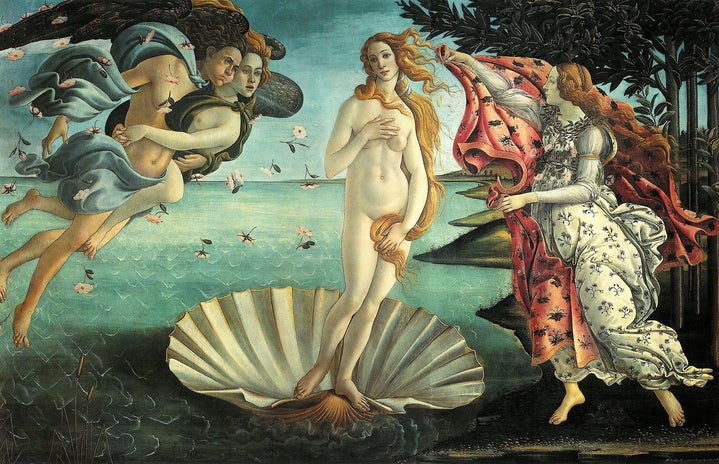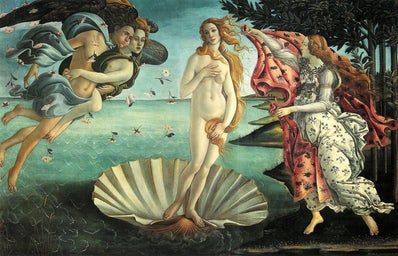Next up in the ‘Ancient Love’ series of what mythological relationships can teach us is *drum roll* Aphrodite and Ares’ relationship!
Just like Zeus and Hera, Aphrodite and Ares’ relationship is similarly unstable. Aphrodite stands in direct opposition to what Ares represents: it all comes down to love vs. war, two very passionate, emotional, similar and yet dissimilar entities. This makes sense, because when we’re in love we fight for what we love and who we love, even if it goes against what everyone else thinks. It makes sense that Aphrodite and Ares would have a relationship of the same contrasting description as their values and characters are inherently caught up with one another. Although the phrase ‘opposites attract’ is relevant here, it’s not necessarily a good factor within their unstable relationship.
Let’s break down their relationship:
- Aphrodite: Goddess of Love and Lust
First and foremost, Aphrodite was the goddess of love and lust. This is an important factor in understanding Aphrodite’s character, as being the goddess of love and lust could indicate that Aphrodite cannot be tied down to one person. Perhaps Aphrodite is polygamous? Maybe she wants an open relationship? Whichever way, Aphrodite cannot be tied to one person, it isn’t in her nature. Therefore, Aphrodite is unable to have a monogamous relationship and should not be forced into one, as the outcome won’t be a happy one.
2. Arranged marriage
Aphrodite was forced to have an arranged marriage by Hera, who organised for her son, Hephaestus, to marry Aphrodite. It’s consistently stated in various myths that Hephaestus was unattractive, ugly and disfigured. Whilst we all know that looks aren’t everything, the fact that everyone in mythology viewed Hephaestus as this, clearly denotes that the ancient Greeks valued looks over character. Thereby meaning, that if no mortal or other god was happy with Hephaestus’ looks, Aphrodite certainly wouldn’t be happy.
As a result of this arranged marriage, Aphrodite in her unhappiness, started countless affairs with both gods and mortals. This is because of Aphrodite’s nature – being unable to love just one individual. Evidently, this arranged marriage was pressurising Aphrodite into conforming to Hera’s view of monogamy – being the goddess of marriage. The multiple affairs Aphrodite engaged in, demonstrates her unhappiness and discontent with her arranged marriage.
3. Aphrodite and Ares’ affair
Aphrodite’s most significant affair is with Ares, the god of war. On one of their nights together, they overslept and Helius, the sun god, saw the lovers together.
Helius told Hephaestus what he had seen and Hephaestus made a net (being the blacksmith god) that would catch the lovers in the act. Hephaestus told Aphrodite he was going away for a while, and Aphrodite made Ares come to her. In the morning, Helius caught the lovers in the net and gathered all the gods to witness their affair, as the naked couple were trapped.
4. Cheating has consequences
Aphrodite deliberately and maliciously snuck behind Hephaestus’ back, without revealing her true feelings and her actions. What’s worse is that Ares is Hephaestus’ brother and that they slept together in Hephaestus’ bed. Perhaps this is the first instance of ‘karma’ in mythology. It goes to show that cheating in mythology is viewed the same as it is in the 21st century, as morally wrong.
Conclusion
As a result of being freed from the net, both Aphrodite and Ares parted ways. However, they eventually found their way back to each other and carried on the affair even after Hephaestus and Aphrodite had 5 children together – the most famous being Eros.
What can we learn from Aphrodite and Ares?
Ultimately, Aphrodite should have been true to herself and revealed her feelings and character to Hephaestus. Instead of lying and cheating with multiple partners behind Hephaestus’ back, she should have explained it was not in her nature to be committed to just one person, being the Goddess of love and lust. Ares and Aphrodite eventually found their way back to each other, living not as husband and wife but as friends and lovers. However, Aphrodite could have saved the pain and humiliation by being true to herself.


